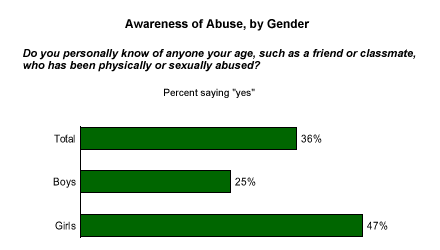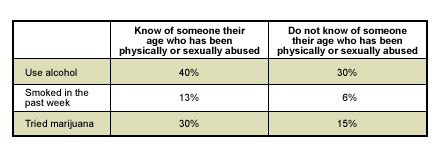Heinous as the idea may be to most Americans, child abuse remains fairly widespread in the United States. The most recent report on child maltreatment from the U.S. Department of Health and Human Services (HHS) reports that approximately 903,000 children were victims of abuse and neglect during 2001. The latest Gallup Youth Survey* produces a similarly disturbing figure regarding adolescents: more than one in three 13- to 17-year-olds (36%) say they are personally aware of someone their own age who has been physically or sexually abused.

Among teen-agers, it can be particularly difficult to assess abuse rates because teens may be exposed to physical or sexual abuse not only by family members and other adults, but also from their peers (e.g., intimate partner abuse). Definitions of adolescent abuse, as well as methods for tracking its prevalence, vary widely among social service, criminal justice, and academic sectors. Another problem has to do with self-reporting -- teens may fear reporting abuse for a variety of reasons, including fear of retaliation by their abusers, or feelings of shame and self-recrimination commonly connected to child abuse.
Due to the potential reporting problems described above, the latest Gallup Youth Survey took a less direct approach in asking teens about abuse. Respondents (aged 13 to 17) were asked about their awareness of abuse among peers: Do you personally know of anyone your age, such as a friend or classmate, who has been physically or sexually abused? While the question has little absolute value with regard to the prevalence of abuse among teens, it may be useful to track increases and decreases over time, and to look for differences by demographic group.
Demographic Differences
Results from the initial asking of this question reveal only a few obvious differences. As might be expected, girls are almost twice as likely as boys to say they are personally aware of a peer who has been abused, 47% vs. 25%.
There are indications of slight regional differences and differences by level of parents' education: 39% of teens in the South and West say they are personally aware of abuse, compared to 31% of those in the Midwest and 29% of those in the Northeast. And teens who say neither of their parents attended college are somewhat more likely than those who say both parents attended college to be personally aware of physical or sexual abuse of someone their own age.
Health Behaviors
Perhaps more interesting is a possible connection between teens' awareness of abuse and their likelihood to engage in high-risk behaviors. Though the question doesn't necessarily tap teens' own experiences, those who indicate awareness of abuse are more likely to say they use alcohol, have tried marijuana, and smoked cigarettes in the last week.

Given that links between physical and sexual abuse and subsequent teen substance abuse -- as well as links between abuse and involvement with the juvenile justice system -- have been well documented, the relationship between these responses bears watching in future surveys.
*The Gallup Youth Survey is conducted via an Internet methodology provided by Knowledge Networks, using an online research panel that is designed to be representative of the entire U.S. population. The current questionnaire was completed by 1,200 respondents, aged 13 to 17, between Jan. 23-Feb. 10, 2003. For results based on the total sample, one can say with 95% confidence that the maximum margin of sampling error is ±3%. For a complete description of the sampling and weighting procedures used to conduct the survey, click here.